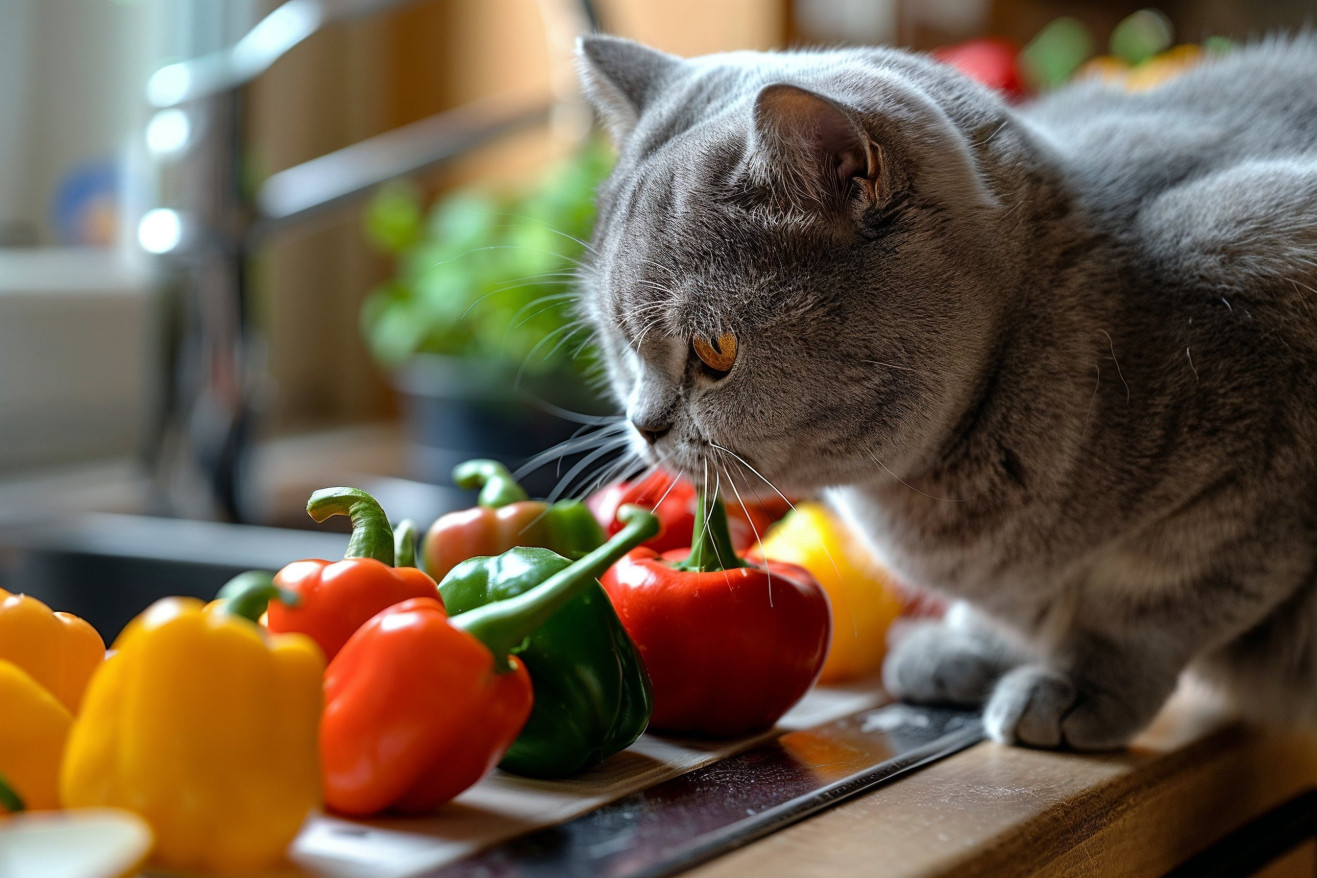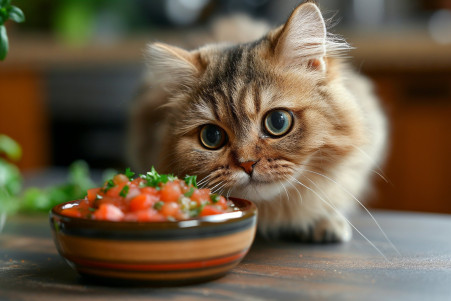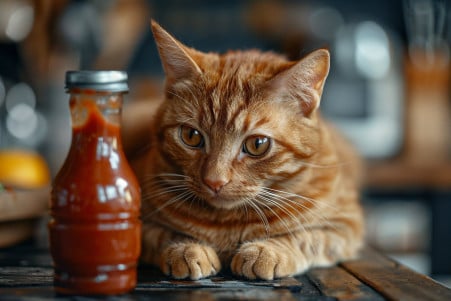Can Cats Have Pepper? Hazards and Side Effects Explained
8 March 2024 • Updated 7 March 2024

Pepper is a common ingredient in many human dishes, but is it safe for cats? Cats should not eat black or chili peppers because the compounds capsaicin and piperine can lead to digestive upset and discomfort. Bell peppers are safe for cats to eat in small amounts, but it’s important to make sure that you remove the leaves and stems, which contain solanine, a substance that can be poisonous in high doses.
Our investigation will involve looking at veterinary perspectives and toxicology studies to find out how pepper impacts cats. We’ll also look at the nutritional research on feline diets and what cats need to eat to figure out if different types of peppers are safe for your furry friend.
This will help you make sure that you’re keeping your cat safe and healthy while still giving them the nutrients they need, with a focus on how their digestive system reacts to these spicy substances.
Can cats have pepper?
Dangers of Capsaicin and Piperine to Cats
Cats are especially sensitive to capsaicin and piperine, the compounds responsible for the heat in black and chili peppers, and can experience significant pain and health problems if they come into contact with them.
Research on the effects of capsaicin on the micturition reflex in cats demonstrated that even at low doses, capsaicin can cause changes in normal physiological responses.
Meanwhile, studies on piperine have shown acute toxicity in mice, rats, and hamsters, indicating that cats are also at risk.
If cats are exposed to capsaicin and piperine, they can experience vomiting, diarrhea, and respiratory distress.
Cats are especially vulnerable to capsaicin and piperine because their digestive systems can’t break down these powerful compounds, which makes them more likely to be poisoned. If a cat consumes black or chili pepper that contains capsaicin and piperine, it’s important to seek veterinary care immediately to help manage the potential toxic effects. The European Food Safety Authority has set maximum levels for black pepper in animal feed, including for cats, that are much lower than the levels humans consume.
Pet owners should be aware of these limits and make sure their cats aren’t exposed to dangerous amounts of capsaicin and piperine, even if it’s just to satisfy their curiosity.
Instead, they should prioritize their pets’ safety and well-being.
Cats Are Obligate Carnivores
Cats are obligate carnivores, which means their bodies are biologically adapted to get the nutrients they need from animal sources. According to the Cornell University College of Veterinary Medicine, this means that a cat’s diet should be high in protein, moderate in fat, and low in carbohydrates. Cats also need essential nutrients like vitamins, minerals, fatty acids, and amino acids, which are usually supplied in a balanced diet and don’t need to be supplemented.
As the VCA Animal Hospitals explains, cats don’t have the metabolic pathways to digest plant-based foods as efficiently as other animals. For example, taurine and arachidonic acid are essential nutrients that cats can only get from animal tissues. These nutrients are essential for heart health, vision, and reproductive health. Although cats can metabolize plant material, like that found in bell peppers, it doesn’t provide the complete nutrition that cats need.
Because of the potential for nutrient deficiencies and toxicities, a statement by UK Pet Food emphasizes the danger of using plant-based ingredients in cat food that may not meet a cat’s nutritional needs or may contain toxic substances.
When you’re looking for treats or supplements for your cat, it’s important to make sure that you’re prioritizing animal-based options that meet your cat’s nutritional needs and to talk to your vet to make sure that they’re safe and effective for your cat.
Can Cats Eat Bell Peppers?
Unlike the spicy peppers that are dangerous for cats, bell peppers are a safe and healthy option for cats. According to WagWalking, cats can eat bell peppers in moderation because they don’t contain any known toxins.
Plus, they have some great health benefits. Bell peppers are high in vitamin C and iron, which can help prevent anemia and boost the immune system. The antioxidants in bell peppers can also help protect against a variety of diseases, including cancer, dementia, arthritis, and heart disease, which can help your cat live a longer, healthier life.
To introduce this crunchy vegetable to your cat, start by cutting it into small, bite-sized pieces. You should also be mindful of the portion size, especially when you consider a cat’s daily caloric intake.
A quarter to a half of a small bell pepper is more than enough for a cat. If your cat has a sensitive stomach, you may want to try feeding them cooked bell peppers, which can be easier to digest. Just be sure to cook them without any harmful seasonings like salt, onions, or garlic.
As with any new food, you should introduce bell peppers into your cat’s diet slowly so you can watch for signs of food sensitivities or allergies, including vomiting or diarrhea.
While bell peppers can be a fun treat, they shouldn’t replace the meat-based nutrients that cats need to thrive. Instead, treats should be used to supplement a cat’s regular diet to ensure they get the nutrients they need to stay healthy and avoid tummy troubles.
Cats’ Sensitive Senses: Aversions to Smell and Taste
Cats’ senses of smell and taste are highly sensitive, which contributes to their aversions to certain foods. According to a report by PAWS Chicago, cats have more than 200 million odor sensors, which makes their sense of smell 14 times stronger than that of humans. This means that strong smells, like pepper, can be too much for them.
Meanwhile, cats are less likely to eat certain flavors because they have fewer taste buds than humans, especially those that detect sweetness, which means they are less likely to eat a variety of flavors.
Cats.org.uk quotes veterinary nurse Helen Crofts, who explains that cats’ sensitivity to certain smells, like citrus, is due to their strong odor, which can lead to a natural aversion, even though people may find them pleasant.
From an evolutionary perspective, this aversion may help protect cats from eating plants that are toxic or non-nutritive. Pet owners can use this knowledge to their advantage by using scents to keep cats away from certain areas, which helps both the cats and their owners.
Pet owners who are aware of these sensitivities can also better control their cats’ environments and what they eat.
Conclusion: Cats and Peppers
In summary, bell peppers are okay for cats to eat in small amounts as a rare treat, but black and chili peppers should be avoided because they contain capsaicin and piperine, which can lead to digestive upset and other negative side effects in cats.
Cats are obligate carnivores, which means their nutritional needs are different from those of humans and other animals, and they require a diet that is primarily made up of animal-based nutrients. Therefore, cat owners should be mindful of this and avoid feeding their cats foods that could be potentially harmful.
Always talk to your vet before introducing a new food, including bell peppers, to your cat’s diet. Your vet can give you personalized advice based on your cat’s specific nutritional and health needs.
Cat owners should be aware of what their cats can and can’t eat, feed them new treats in moderation, and prioritize their cats’ nutritional needs over their own curiosity. After all, the spices that make human food taste better can make cats feel worse.


